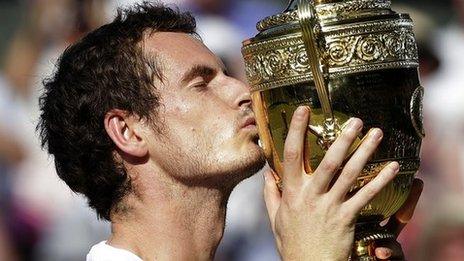Andy Murray rise to world number one 'pretty amazing', says John McEnroe
- Published
- comments
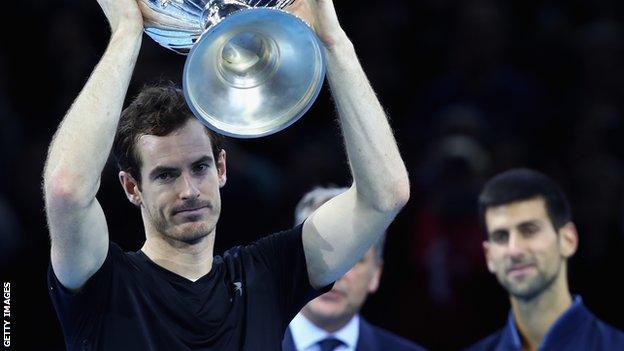
Murray had to match Novak Djokovic's results at the O2 Arena to remain world number one
Andy Murray, showered in ticker-tape and applause, carried the same dazed and disbelieving look at the ATP World Tour Finals on Sunday evening that we saw when he finally won Wimbledon three years ago.
To topple Novak Djokovic at the O2 Arena was a mighty achievement, to replace him as the best player in the world was simply extraordinary.
Murray had managed to overhaul the Serb in the rankings with a remarkable run of form in the second half of the season, but beating him across the net proved it was more than a statistical quirk.
As Djokovic himself said: "Andy is definitely number one in the world."
What we know about the Scot is that he will leave no stone unturned in trying to permanently dethrone Djokovic.
"Murray is an amazing athlete. He's going to try to take advantage of this time because it's limited, we all know that," said former number one John McEnroe.
"I do anticipate he's going to do everything possible to take advantage of it.
"But I would hope there's a lot of hungry players behind him that see a void and an opening, as well as Novak, who wants to catch Rafa Nadal and potentially Roger Federer."
'He's persevered and he's also gotten better'
Andy Murray beats Novak Djokovic: Best shots from ATP World Tour Finals
Mats Wilander: "Murray has learned how you have to keep on practising harder and harder and harder, just to stay where you are."
Murray's work ethic is well known, and remains as punishing as ever as he enters the latter stages of his career.
The second serve was long seen as a weakness in his game, and is something he has taken steps to address.
The success was there for all to see in his semi-final at the O2 - no longer a timid effort there for the taking, it dug him out of trouble more than once against Milos Raonic.
Heading into the season finale at the O2 Arena, Murray had won 54% of the points on his second serve in 2016 - a 2% rise on the previous year and equalling his best ever.
Hardly an eye-popping statistic, but one of a number of 'marginal gains' that, played out across 11 months and 18 tournaments, can make a significant difference to the more obvious numbers of titles won and ranking points gained.
"How many times have we said to be more aggressive on his return? Move forward more often? Hit his forehand bigger?" said McEnroe.
"He's been extremely patient, he's persevered and he's also gotten better. That combination is hard to do when you've been dealt a bunch of blows against three of the greatest players who ever lived.
"To come out of that a better player, and a better man it appears, is pretty amazing, so I give him a lot of credit."
The numbers behind Murray's second serve
Craig O'Shannessy, ATP analyst
"A major component of Murray's ascendency to world number one this season is his substantial improvement on second serve.
"At the 2015 Australian Open, Murray's average second serve speed in his opening round against Yuki Bhambri was a pedestrian 85mph. In his 2016 opening round match in Melbourne against Alexander Zverev, his second serve speed averaged 93mph, with the fastest at 108mph.
"Points won on second serve have steadily risen for Murray from 51% won in 2014, 52% last year, and now up to 54% in 2016, which puts him 13th on tour this year in this critical category - up from 25th last season."
'Lendl gave the push Murray needed'
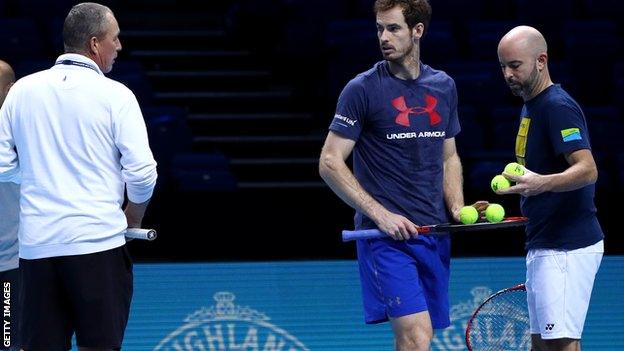
Ivan Lendl (left) has coached Murray when the Scot has won his three Grand Slam and two Olympic titles, while Jamie Delgado (right) had previously coached Luxembourg's Gilles Müller
Ivan Lendl: "I'm not sure we talked about number one much. Andy sets his own goals, I just try to help him get them."
When Ivan Lendl was named on the shortlist for ATP coach of the year,, external there were a number of voices calling for the inclusion of Jamie Delgado - the other, lower profile coach brought into Team Murray this year.
Delgado has been a constant presence since his appointment in February, providing a technical knowledge, hitting ability and friendship that Murray clearly values highly.
If Delgado offered stability on the week-in, week-out grind of the tour, Lendl's return in June gave Murray the aura of Grand Slam pedigree that had started to slip.
"We agreed to start working with each other a few days after the French Open," said Murray.
"It was quite a big boost for me, that in itself, that he wanted to come back to work with me again."
Will Federer and Nadal challenge again? |
|---|
Mats Wilander, former world number one: "If we're honest, at 35 is Roger Federer going to win another Slam and threaten the top three? At times, yes, but I'm not really sure. |
"Rafa Nadal might win a French Open or two but is he going to be threat again on hard courts? He doesn't really have the game to stay up there, so he's not going to take away the number one. Nor is Roger. |
"Djokovic has been there for so long but at some point his intensity and motivation has got to slip. So who's left? Andy Murray." |
Their first practice session back together took place between rain showers at Queen's Club, with Murray hammering forehands while Lendl encouraged him - "very good, Andy, very good" - amid the usual dry one-liners.
"Just picking up balls," is how Lendl described his role this week.
"I sensed something when Ivan came on board again that it gave the little push that Murray needed at that time," said McEnroe.
"It was there potentially anyway but the timing was impeccable. All of a sudden he had more of a strut."
'Number one more likely February or March'
McEnroe: "If you had told me six months ago that this would even be an issue, I would have said you're crazy, because Novak was so far ahead."
Sitting in the press room at the Miami Open in March, Murray looked bewildered as he contemplated an error-strewn defeat by Grigor Dimitrov in the third round.
A few days later, Djokovic swept out of Key Biscayne towards the airport with his sixth Miami trophy alongside him, and his supremacy unquestioned.
By the time the players return to Florida next March, Murray could be well and truly ensconced at the top of the rankings.
In just five months he has erased a deficit of over 8,000 ranking points, and Djokovic will begin 2017 defending titles - and points - in Doha and then at the Australian Open.
For Murray, poor performances this year in the back-to-back Masters events of Indian Wells and Miami create an opportunity for further gains in 2017, when he will have few points to defend compared to Djokovic, champion of both.
Andy Murray: World number one reflects on 'very special day'
"When you play well consistently, number one becomes attainable," said Lendl.
"I'm not sure I would have thought it will come this quick. I thought it was a possibility but a little more likely February or March."
Perhaps as important as the points is the perception, and Sunday's victory goes a long way to transferring the fear factor among the rest of the tour from Djokovic to Murray.
Much will depend on Djokovic himself, the man to beat for five of the past six years and still chasing down the likes of Federer and Nadal in the all-time list.
The Serb described some of his tennis in London as "flawless", but all the frailties of recent months returned in the final and the question is whether the last week, or the last six months, will prove to be the new normal for Djokovic.
"At some point you're going to hit a wall of some kind, for whatever reason," said McEnroe.
"When it comes, people are surprised, but it always happens. You just don't know how long it will last. The jury is out."
- Published20 November 2016
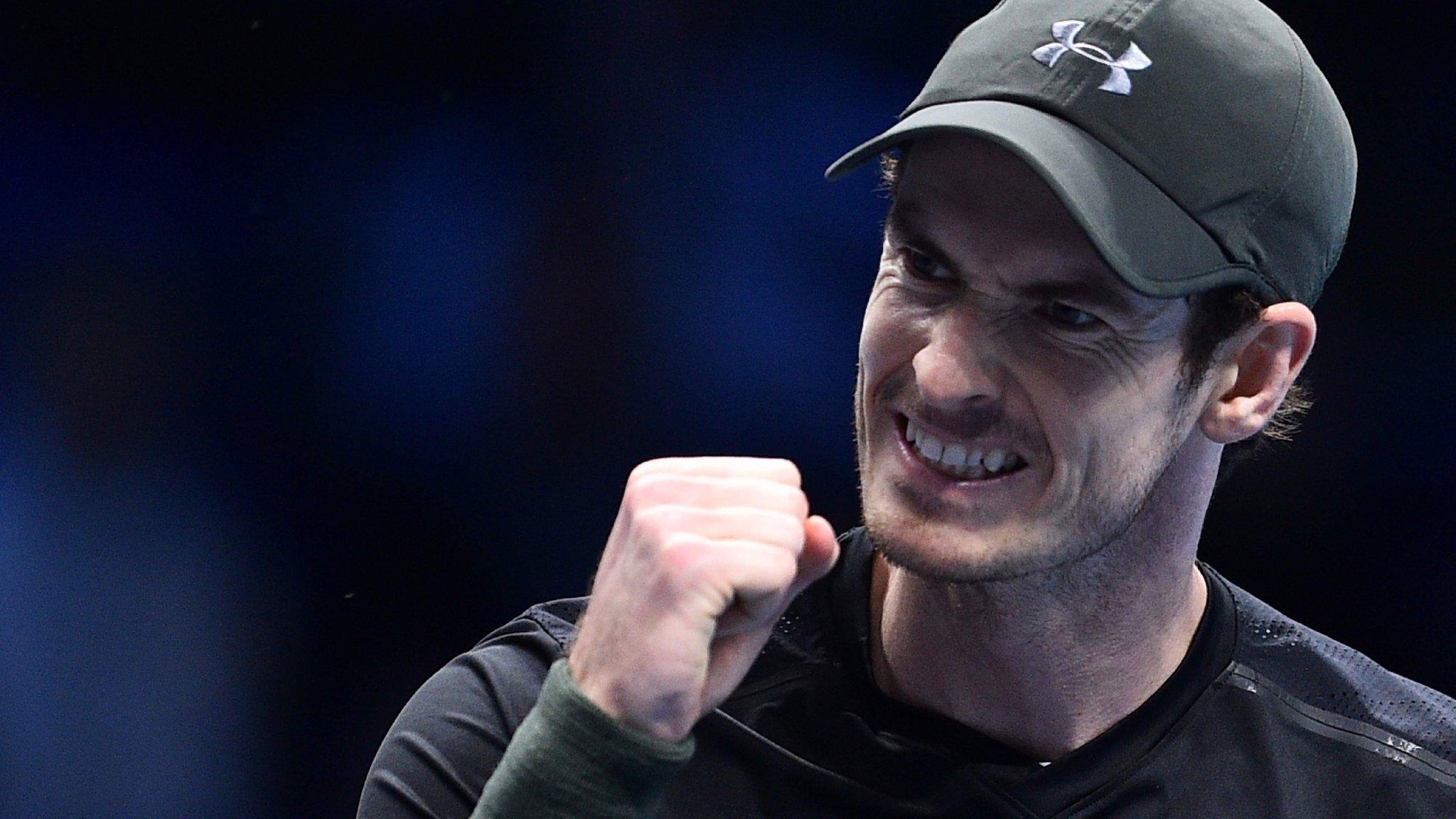
- Published20 November 2016
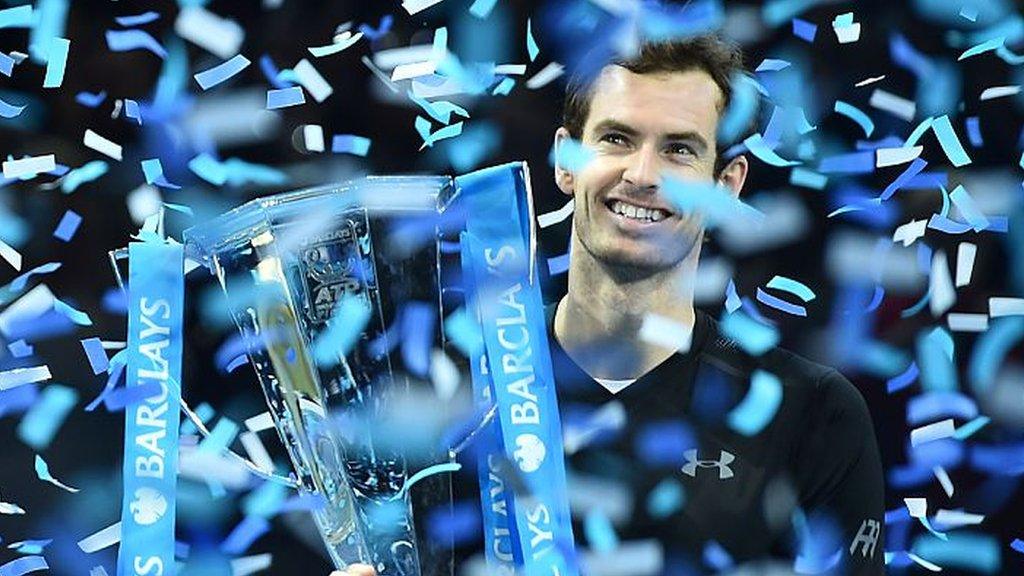
- Attribution
- Published21 November 2016
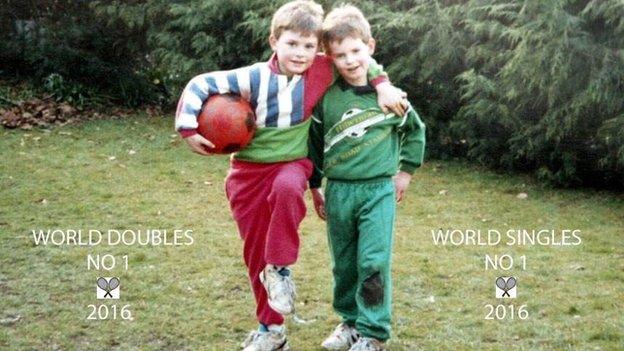
- Published19 November 2016
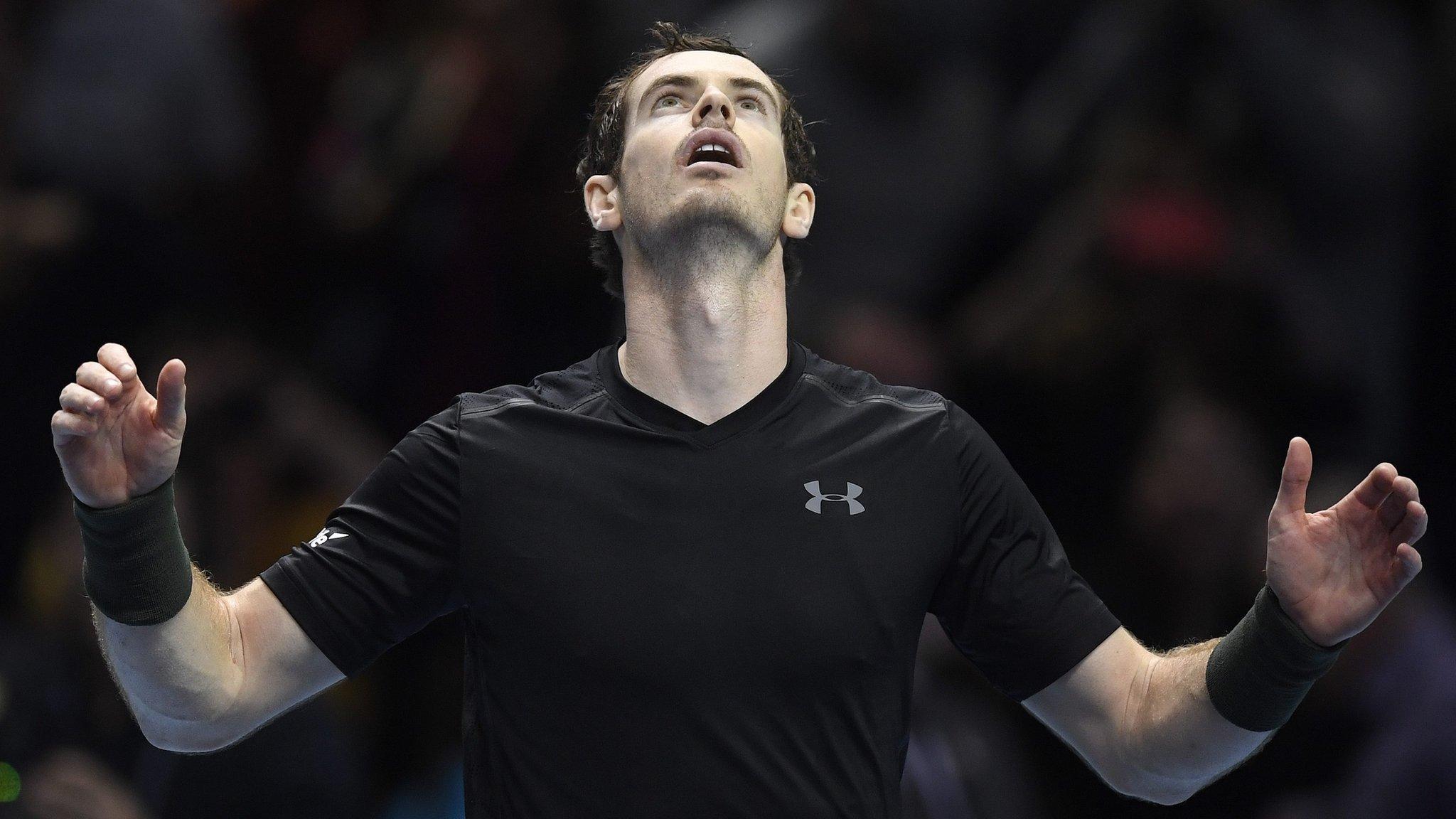
- Published15 August 2016
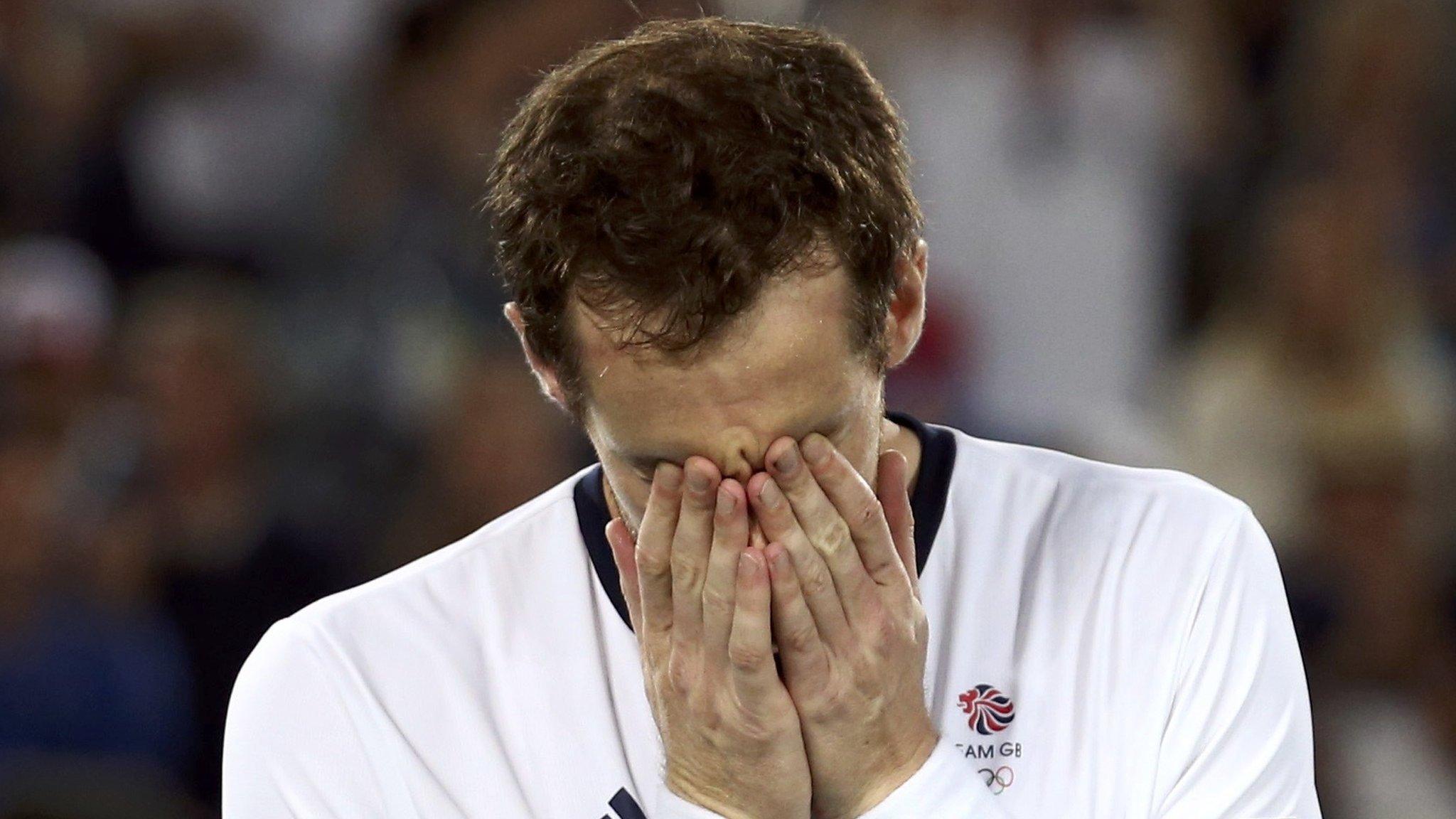
- Published7 July 2013
